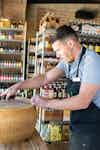Every morning, local coffee shops operate according to an organized regimen. Espresso ground, milk steamed, and drinks sipped. However, this age-old rhythm is under threat for coffee shops across the country as tariffs start to bite.
Most coffee shops in the U.S. source their beans internationally, from countries near the equator that have the necessary temperatures and altitude for growing coffee.
Alakef Coffee Roasters in Duluth, Minnesota, sources the majority of its coffee beans from Brazil.
“If a ... tariff remains on Brazil, I don't know if we'll survive,” CEO Alyza Bohbot says. “Right now, we're just trying to hold onto every dollar that we have because we're not sure that those dollars are guaranteed given the tariffs.”
Small Business Voices on Tariffs
The Bitter Brew
Amid rising uncertainty around tariffs, small businesses like your local coffee shop are bracing for increased prices on goods that can’t be easily or cheaply produced in the United States.
With tariff rates likely to be higher in the next six months, small businesses are left calculating ways to adjust and survive, and unlike large corporations, they don’t often have the financial cushion to absorb financial costs brought by tariffs.
Beyond the soaring coffee bean prices, Bohbot’s company has also experienced a stall in manufacturing profitability, causing an inability to focus on growth from investment. Without guaranteed profitability, companies are unable to confidently plan for the future.
“[Tariffs are] punishing those of us who are trying to employ people, provide good benefits, create opportunity, and keep manufacturing when we don’t have any control over where we get our product from,” Bohbot says.

For Hrag Kalebjian, Head of Business Development and Operations at Henry’s House of Coffee, this means he is forced to decide: cut back or charge more and risk losing customers.
“We either raise prices, or we try to figure out ways to cut costs,” Kalebjian, a member of the U.S. Chamber’s Small Business Council, says. “So, there's this tension of, I have to do something, but I also don't want to lose customers.”
His coffee shop in San Francisco sources coffee from Africa, South Asia, South America, and Central America. Kalebjian is experiencing a 10% tariff importing coffee beans from these regions.
Tough Choices
Even 787 Coffee, a Puerto Rican coffee company that grows most of its beans domestically in Puerto Rico, is not immune to tariff costs. 787 Coffee is experiencing increased prices for packaging, cups, and lids, which are sourced from China.
“We can't negotiate better rates with suppliers or shift our sourcing overnight like the big players can,” says Brandon Peña, Owner of 787 Coffee, a 2024 U.S. Chamber CO—100 Top Honoree. “When our packaging costs go up, our equipment becomes more expensive, or our vendors start charging more—we feel it immediately.”

As a result, Peña says that his plans to hire more staff for his company with locations in New York, New Jersey, and Texas, and extend leases, had to be postponed.
“We don't feel that small businesses are truly considered in those conversations,” says Peña. “The reality is that small businesses like mine are the ones who feel these impacts most acutely.”
Coffee shops are finding ways to adapt, but it isn’t easy. According to Kalebjian, the price of coffee from farms changes any given day, so to reduce costs, he has ordered inventory on a weekly basis, rather than monthly.The company has also focused on increasing sales per order through upselling techniques.
“We have to make some tough choices; so yes, of course, small businesses are going to be impacted because their suppliers are being impacted,” Kalebjian says. “The whole tariff situation has been kind of a disaster.”
More on Tariffs
About the author

Roger Hart
Roger Hart is an intern on the Communications team at the U.S. Chamber of Commerce.








